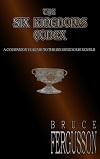I’ve never owned a Mustang, but the car keeps showing up in my life.
An old flame owned one. She also owned–at the same time, mind you–an Austin-Healy Mark 3000. She used the Mustang for road trips but still, having a choice of sweet cars to take anywhere was doubly impressive to me; then again I was only 27.
My ex-wife bought a second car also, a (cherry) maroon Mustang, not long after the divorce. I assumed that was some kind of ’cause and effect’, though she rarely drove the car, keeping it under wraps in her carport. (My vehicular response to that turning point in my life was more practical though I also bought a used Ford–a Taurus station wagon).
And back in 9th grade, my English teacher had each kid in the class write an advertising slogan–I don’t remember the context of the assignment. My slogan–you guessed it–was one for the Mustang, which I thought was a cool car:
DON’T BE CORRALLED. GET A MUSTANG.
MUSTANG FOR ’65
Now there’s another Mustang in my life.
It’s on the cover of my latest suspense novel, Two Graves for Michael Furey. You can’t see much of it besides the red color but it’s there all right, behind the glare of the headlights.
This red Mustang has more than a bit part in the novel. The car first appears when Michael Furey is still getting around on a bicycle, sets his sights on buying a wealthy neighbor’s used but cherry Mustang, makes a deal with the owner and begins saving up for it.
Well, seeing as how this is a suspense novel…things happen that you wouldn’t find in a book on a 9th grade reading list.
Speaking of which, the seed for the idea for Two Graves for Michael Furey came when I reread a story you’ll find on many college freshman reading lists. You English majors out there might recognize the name–Michael Furey–from that particular story. They even made a movie. If I remember correctly, Gabriel Byrne was in it, but he’s way too old now to be in the film they’ll make of my novel–hey, you can always dream. Don’t be corralled, right?
Okay, one more hint about who wrote that famous story: he wrote books that were banned; always a fine way to get people to read them. The guy lived in a time when they did that sort of thing, unlike today. Mostly. Which is too bad. Writers these days need all the help they can get to raise their visibility, especially if a…certain suspense novel isn’t one that James Patterson, David Baldacci or Brad Thor would have written.
Anyway, that slogan that I–excuse me, that Michael Furey–thought of? It’s in the book, of course. We’re talking about another road trip in Litlandia (my 6th), where anything goes; where mileage is always what you want it to be, and the highways invariably lead back to where you started, regardless of the direction you take.


